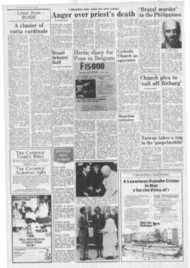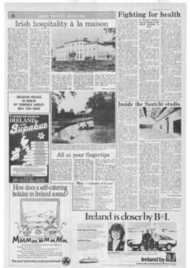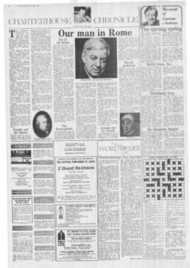Page 1, 3rd May 1985
Page 1

Report an error
Noticed an error on this page?If you've noticed an error in this article please click here to report it.
Tags
Share
Related articles
Truce Reached In Malta Schools War
Governthent Fear Of Upsetting Electorate Before Vote Count
Malta In Talks On Catholic Schools
Malta To Receive The Pope And A Saint!
Mintoff Makes A Grab For Property
Church-state compromise over Maltese schools
by our Malta correspondent MALTA'S Catholic schools are to phase in free education over a period of three years under the terms of a compromise agreement drawn up in the Vatican which opens the door to renewed negotiations over the long delayed concordat between the Maltese government and the Holy See.
The terms of the agreement, thought to be substantially the same as those rejected by the Maltese cabinet last month, guarantee cht .711 schools their autonomy w :e bowing to government pressure for a common entrance examination for all the island's schools.
The deal was signed in the Vatican by Archbishop Achille Silvestrini, Secretary for the Public Affairs of the Church, Archbishop Joseph Mercieca of Malta, Bishop Niko! Cauchi of Gozo, and by Maltese officials including the Senior Deputy Prime Minister, Joseph Cassar and Dr Alex Sciberras Trigona, the Foreign Minister.
It follows many months of often violent conflict over the future of the island's 18 Catholic schools, which culminated in a mob attacking and ransacking the curial offices in Valetta last year.
The text of the agreement details that admission to church schools will be by a national examination. Parents will, however, be able to indicate their preference of school. Those children currently studying at church primary
COMPROMISE — Malta's PM Carmelo MIlsud Bonnici
schools will be guaranteed entrance into Catholic secondary establishments.
A three-year plan has tassn sketched for the introduction of free education in church schools, and a bilateral commission of church and state delegates is to be set up to discuss rationalisation of the church education system.
When the Maltese government first floated the idea of free education last year, the Maltese church protested that although it found such a concept desirable in theory, it did not have sufficient money to put it into practice.
Under the terms of the accord drawn up in the Vatican, the church will be allowed to hold Collections among Mass-goers for the support of schools. Such offerings were banned by the state during the protracted row over the future of church schools.
The joint commission will also determine the contributions which church and state will make to the upkeep of church schools. The commission will
assess the chut ch's property holdings, often rumoured to be substantial but apparently contradicted by the church's large debt, in order to advise on their best use vis-a-vis raising funds for education.
In church circles in Malta it has been suggested that the present compromise should be seen as a temporary one, giving a breathing space until the 1987 elections which may sec a change of government. The opposition Nationalist Party is more sympathetic to the Church than Prime Minister Carmelo Mifsud Bonnici, and the Nationalist newspaper , In Taghna welcomed the accord as an interim measure.
However Mr Mifsud Bonnici, who succeeded Dom Mintoff in January of this year after serving him as Education Mipister, said that "the education question will form part of a global agreement entrenched in a concordat".
Stepping off the plane from Rome, Mr Cassar said he was extremely satisfied with the agreement as it was an important step towards the normalisation of relations between Malta and the Vattcan.
He added that he hoped that there might soon be an apostolic nuncio appointed for Malta. The post has been vacant for eight years because of churchstate tensions.
A secret ,agreement along the lines of the present accord was drawn up four weeks ago between church officials and government representatives. However, on that occasion the Cabinet rejected the deal, with the most voiciferous critic being Mr Cassar.
blog comments powered by Disqus











